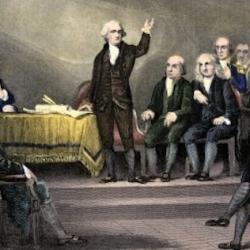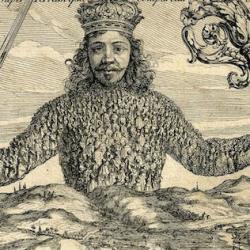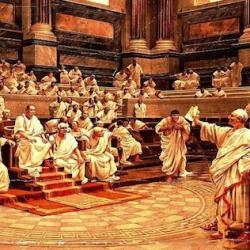Patricia Owens summarizes her recent Economy of Force in a symposium at The Disorder of Things. Her book is a history of modern counterinsurgency, but that history has much broader implications for the history of political thought and scholarship on international relations. As Owens puts it, “The book is a study of oikonomia in the use of force, from oikos, ancient Greek for household. But it also makes a larger claim, that household governance underlies the relatively recent rise of distinctly social forms of government and thought more broadly.”
Households are “hierarchical” and arrange members in specific spatial configuration. The household has not been the same throughout history, but it is the space in which “the life processes of members – real, vulnerable bodies needing food, water, shelter – are administered and the household itself is maintained.” One key point of her argument is that political and social thought has long assumed the household model for government of nations and even for international relations. This produced an inherently hierarchical, conservative orientation in political theory and practice.
Her history is partly the history of the formation of “the social”: “the founding myth of liberalism was that the rise and expansion of commercial ‘societies’ destroyed large-scale household rule, at least where ‘contract societies’ were established; notwithstanding the ever-present need to revert to forms of liberal despotism when non-compliant subjects require domestication. Nonetheless, through the eighteenth-century, ‘society’ would largely replace ‘household’ as the central object of intervention and thought in the core of the major European empires.” Owens doesn’t buy this: Her book “offers a re-narration of this discourse of modern ‘society’, showing the continuing significance and often-colonial genealogies of households through close readings of several traditions of social and political thought.”
In short, “modern capitalist imperial states as initiating a scaling up and transformation of – rather than negation of – large-scale forms of household rule.” “Civil society” became a large form of household, comprised of the oikonomia once associated with the household and the nuclear family, now stripped of its economic functions.
Counter-insurgency develops within this household model of government. Restless members of the national house have to be domesticated and kept under control. It is “good housekeeping” to control colonized populations, and similar housekeeping is sometimes needed to get undomesticated members of the household under control. Owens observes that counterinsurgency is often described today as “armed social work,” and she thinks the analogy apt. But for her it cuts in the other direction: Social work is a form of counter-insurgency. Owens writes, “through the nineteenth-century, the social realm underwent a major structural transformation, with state and non-state ‘social policy’ interventions specifically targeted at populations in revolt, especially women, workers, and colonial natives.”
This was the Social Question of the day: “how to manage the welfare of newly organized and radicalized workers, women and natives such that capitalism and imperialism were not overthrown. Alongside violent repression, administering the life processes and risks of certain populations in revolt was the other primary method for addressing their demands.”
Owens believes that the history and theory of household governance has been obscured by the blinders of liberal theory, the “near pervasive sociomania, or sociolatry, afflicting the human sciences, and international theory as well. Virtually the entire field takes the concepts of ‘social’ and ‘society’ to be timeless and universally applicable, as if they had no history.”
She claims that counterinsurgency is the conduct of oikonomia – not of politics – by other means. And she thinks that politics is actually the solution to the dilemmas she outlines. Traditional political thought won’t serve, since it is a discourse about “household administration.” But this isn’t the only possible politics: “politics might . . . refer to the actions of plural equals freely debating and acting on their common affairs in a manner that was essentially non-violent and unpredictable, that is, not subject to the calculations of oikonomia. Politics would include the non-hierarchical administration of life processes, but politics as such would not be reducible to oikonomia.” For Owens, “resistance to domestication would be the object of political theory.”
There is much to ponder, much to disagree with, here. Owens is right to highlight the importance of the household as a model of governance. She thinks that liberalism’s claim to offer a non-domestic, contractual model of government obscures more than it reveals. There may be something to that, but the divergence of Locke from Fulmer’s patriarchal model isn’t chimerical. Once you find the legal resources to behead the royal head of the national house, it seems you have moved into a new paradigm.
As Andrew Davenport says in his essay in the same symposium, Owens sets up a binary of household v. politics, but doesn’t explain what she means by politics until late in the game and then only briefly. The set-up of Owens argument implies that much political thought has not been about politics at all, but about something else – household management. Davenport suggests sardonically that there is “something at least quixotic about a way of doing so that results in much of the canon of political theory being summarily declared ‘not properly political.’”
One might add that the notion of a politics of plural equals without hierarchy is a utopian dream that has never been realized and probably cannot be. Perhaps family is so much a part of what makes us human that we inevitably gravitate to hierarchies of fathers, brothers, sisters, son, daughters, however we might kick against the goads.
I haven’t read Owens’s book, but from her summary it seems she pays little or no attention to theological questions. A dash of Milbank would enrich her account and perhaps correct some of her missteps.











